“Brethren, join in following my example, and note those who so walk, as you have us for a pattern.” Philippians 3:17
 Years ago Charles Barkley, NBA star, was admonished for some behavior because he was a role model for kids. He very famously snapped back, “I ain’t no role model.” Well, he was wrong. He might have said that he wasn’t a “good” role model, but he could not say he wasn’t “a” role model. He was in a position of responsibility, but one he did not take very seriously. He was castigated for living in denial of his role, as he should have been, but we should not jump too quickly on the “beat Charles like a drum” band wagon, especially if we deny that we are role models as well.
Years ago Charles Barkley, NBA star, was admonished for some behavior because he was a role model for kids. He very famously snapped back, “I ain’t no role model.” Well, he was wrong. He might have said that he wasn’t a “good” role model, but he could not say he wasn’t “a” role model. He was in a position of responsibility, but one he did not take very seriously. He was castigated for living in denial of his role, as he should have been, but we should not jump too quickly on the “beat Charles like a drum” band wagon, especially if we deny that we are role models as well.
Yep, we are all role models and in fact, we ourselves have had role models. Every day we influence someone and every day we are influenced by someone. Role modeling is part of our walk whether we like it or not. We can be like Charles Barkley and deny it, but that doesn’t change it. We may not like it, because that puts some responsibility on our shoulders, but like it or not, we cannot escape it.
we like it or not. We can be like Charles Barkley and deny it, but that doesn’t change it. We may not like it, because that puts some responsibility on our shoulders, but like it or not, we cannot escape it.
We usually think of role modeling when it comes to children. Yesterday I heard some sad news about children and the internet and “smart” phones. The statistics about kids giving out personal information to strangers, the number of hours spent playing games, the kinds of sites frequented, and the dangerous effects from spending so much time on electronic devices was sobering. The conclusion of the study was that “smart phones” and the like were substituting for the normal activities that kids used to be involved in.
Playing outdoors, reading books, playing games, talking around the table, going for rides, eating meals together and other typical family activities of the  past have been replaced by individualized time spent on electronic devices. The final line of the report was most striking, however. It said (I am paraphrasing) that all of this behavior of kids was learned mostly from parents. It said that most kids who spent all their time on electronic devices had parents who lived very similar lives.
past have been replaced by individualized time spent on electronic devices. The final line of the report was most striking, however. It said (I am paraphrasing) that all of this behavior of kids was learned mostly from parents. It said that most kids who spent all their time on electronic devices had parents who lived very similar lives.
It went on to say that the parent’s example was the most important part of the child’s development. In other words, parents set the tone for the entire family by establishing behavior by example, not words. If the parents wanted readers, they needed to read themselves. If they wanted their kids to talk, they needed to talk themselves. If they wanted their kids to pray, they needed to pray  themselves. The conclusion was undeniable. Parents, through example, have the greatest influence on their kids. To extrapolate even further, everyone’s actions have great influence on those around them. We all have the power to influence- the key is, how do we use it?
themselves. The conclusion was undeniable. Parents, through example, have the greatest influence on their kids. To extrapolate even further, everyone’s actions have great influence on those around them. We all have the power to influence- the key is, how do we use it?
When I was coaching, I often read a poem to the players to remind them of their responsibility to others. It was always in any playbook or website I put together. If I was coaching girls, I put “she” in the poem and if boys, I put “he” in the poem. Here is a copy of it like I would have read to my football players.
There are little eyes upon you and they’re watching night and day.
There are little ears that quickly take in every word you say.
There are little hands all eager to do anything you do;
And a little boy who’s dreaming of the day he’ll be like you.
You’re the little fellow’s idol, you’re the wisest of the wise.
In his little mind about you no suspicions ever rise.
He believes in you devoutly, holds to all you say and do; and
He will say and do in your way, when he’s grown up just like you.
There’s a wide-eyed little fellow who believes you’re always right;
and his eyes are always opened, and he watches day and night.
You are setting an example every day in all you do;
For the little boy who’s waiting, to grow up to be like you.
 Although there are a lot of similar poems, sayings, and songs I could quote (and did quote) about our influence on kids, the fact of the matter is, we are all models of some kind to everyone around us. The kids on my team were not only influential on those younger than them, but their peers and elders as well. We are models to our children, grandchildren, nephews, and nieces, but also on our young neighbors, peers, and elders (in my case, there aren’t as many of the elder types any more). We are, just like Charles Barkley discovered, role models no matter what we want to think. As Christians we have an added burden. We represent Christ; we belong to a team; we are not on our own any more.
Although there are a lot of similar poems, sayings, and songs I could quote (and did quote) about our influence on kids, the fact of the matter is, we are all models of some kind to everyone around us. The kids on my team were not only influential on those younger than them, but their peers and elders as well. We are models to our children, grandchildren, nephews, and nieces, but also on our young neighbors, peers, and elders (in my case, there aren’t as many of the elder types any more). We are, just like Charles Barkley discovered, role models no matter what we want to think. As Christians we have an added burden. We represent Christ; we belong to a team; we are not on our own any more.
If people know we are Christians they we scrutinize our actions even more closely. In some cases, they will feel free to imitate them, believing they must be OK because, supposedly, we are OK. Jesus taught us to be “flavoring” to the world. In Mark 9:50 He said, “Salt is good, but if the salt loses its flavor, how will you season it? Have salt in yourselves, and have peace with one another.” The way we live should be like salt is to food: it adds flavor, it preserves, and it causes thirst. We add flavor by making godly choices. We preserve by always speaking the truth in love. We cause thirst for God by living out a life of faith before the world. If we don’t add flavor, don’t preserve the truth, or don’t cause a thirst for God, we are still modeling behavior, just the wrong kind.
We know that we have been influenced by others in our lifetime. In fact, we are still being influenced by others. Who do we allow to shape us? Some in our circle are good and helpful, others dangerous and harmful. One day a farmer grabbed his shot gun to shoot at a flock of pesky crows. Unfortunately, he didn’t see his sociable pet parrot that had joined the crows. After firing a few shots, he walked over to the fallen birds and was surprised to find his parrot badly ruffled with a broken wing. When the farmer’s children saw the injured bird, they asked, “Dad, what happened?” The farmer simply replied, “Bad company.” First Corinthians 15:33 says that “bad company corrupts good morals” and yet we sometimes “hang” with those who are not beneficial to positive behavior. We will experience the same consequences of those we flock with. If that is the case, we will soon be the person that others should not “hang” with as well.
After firing a few shots, he walked over to the fallen birds and was surprised to find his parrot badly ruffled with a broken wing. When the farmer’s children saw the injured bird, they asked, “Dad, what happened?” The farmer simply replied, “Bad company.” First Corinthians 15:33 says that “bad company corrupts good morals” and yet we sometimes “hang” with those who are not beneficial to positive behavior. We will experience the same consequences of those we flock with. If that is the case, we will soon be the person that others should not “hang” with as well.
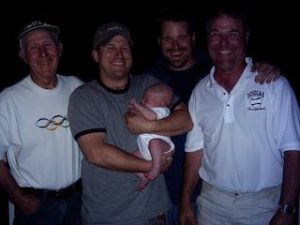 Proverbs puts it pretty bluntly, “He who walks with wise men will be wise, but the companion of fools will suffer harm.” Prov. 13:20 So we are influencers and we are the influenced. Both positions require discretion. In one we must examine our own actions in the other the actions of others. As influencers of our children and others, we should not be like the Pharisees. Look how Jesus spoke of their influence: “therefore all that they tell you, do and observe, but do not do according to their deeds” Matt. 23:5. In other words, though their words might be correct, don’t follow their deeds. Do we talk bigger than our actions? The bottom line is that should neither be Pharisees nor follow Pharisees.
Proverbs puts it pretty bluntly, “He who walks with wise men will be wise, but the companion of fools will suffer harm.” Prov. 13:20 So we are influencers and we are the influenced. Both positions require discretion. In one we must examine our own actions in the other the actions of others. As influencers of our children and others, we should not be like the Pharisees. Look how Jesus spoke of their influence: “therefore all that they tell you, do and observe, but do not do according to their deeds” Matt. 23:5. In other words, though their words might be correct, don’t follow their deeds. Do we talk bigger than our actions? The bottom line is that should neither be Pharisees nor follow Pharisees.
Paul told the believers in Thessalonica that he had, through his actions, become a role model for their behavior. He and his companions had proven themselves as men of God by their consistent dedication to the truth. Can we look at our those around us and say we are setting an example of how to be and that they should try to be more like us. Regardless of whether we say it or not- they will be, so what we are should be what we hope they will be.
 Proverbs says that “A good name is to be more desired than great wealth” (Prov. 22:1). A good name is not so easy to earn, but very easy to destroy. Our character should gain us a hearing to proclaim the gospel to others, not shut the doors. It is not easy to be a role model like Paul. Next to Christ, he was what we should strive to be not only for ourselves, but for others. He lived out his faith, so that anyone watching his life would be able to tell there was something wonderful inside him.
Proverbs says that “A good name is to be more desired than great wealth” (Prov. 22:1). A good name is not so easy to earn, but very easy to destroy. Our character should gain us a hearing to proclaim the gospel to others, not shut the doors. It is not easy to be a role model like Paul. Next to Christ, he was what we should strive to be not only for ourselves, but for others. He lived out his faith, so that anyone watching his life would be able to tell there was something wonderful inside him.
If we want to be influenced by others in a positive way, we should surround ourselves with people with people who care about their actions. If we want to be people of positive influence, we should care about our own actions. It won’t be easy, but Hebrew’s 12:1 says “Therefore we also, since we are surrounded by so great a cloud of witnesses, let us lay aside every weight, and the sin which so easily ensnares us, and let us run with endurance the race that is set before us…” Let’s run the race well, knowing that we are being watched and many around us will try to run it just like us.











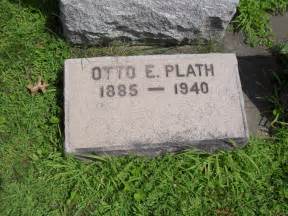
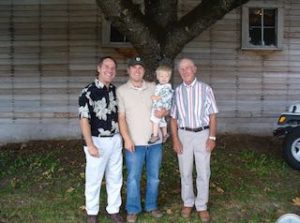



 “The Lord is not slow to fulfill his promise as some count slowness, but is patient toward (us), not wishing that any should perish, but that all should reach repentance.”
“The Lord is not slow to fulfill his promise as some count slowness, but is patient toward (us), not wishing that any should perish, but that all should reach repentance.”
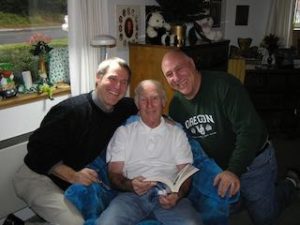
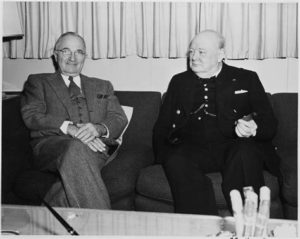 They were in a special car which had the presidential seal hung up on a wall. Truman noticed Churchill studying the seal and he pointed out that he had changed it so that the eagle on the seal was turned toward the olive branch instead of the arrows. “Why not put the eagle’s head on a swivel,” suggested Churchill. “That way
They were in a special car which had the presidential seal hung up on a wall. Truman noticed Churchill studying the seal and he pointed out that he had changed it so that the eagle on the seal was turned toward the olive branch instead of the arrows. “Why not put the eagle’s head on a swivel,” suggested Churchill. “That way  you could turn it to the right or the left, depending on what the occasion warranted.”
you could turn it to the right or the left, depending on what the occasion warranted.” 
 “Finally, all of you, have unity of mind, sympathy, brotherly love, a tender heart, and a humble mind. Do not repay evil for evil or reviling for reviling, but on the contrary, bless, for to this you were called, that you may obtain a blessing.”
“Finally, all of you, have unity of mind, sympathy, brotherly love, a tender heart, and a humble mind. Do not repay evil for evil or reviling for reviling, but on the contrary, bless, for to this you were called, that you may obtain a blessing.” the shoulders, and threw him out his tent into the cold night air.
the shoulders, and threw him out his tent into the cold night air. some raggedy clothes and carrying a well-worn backpack.
some raggedy clothes and carrying a well-worn backpack. cars packed bumper to bumper because the right lane was closed ahead.
cars packed bumper to bumper because the right lane was closed ahead. We sometimes look at the great people of the Bible as super heroes who God enlisted in a task because they were fearless and would do anything they were told unflinchingly and without any hesitation.
We sometimes look at the great people of the Bible as super heroes who God enlisted in a task because they were fearless and would do anything they were told unflinchingly and without any hesitation. inadequacies and his difficult circumstances, he could not be used of God.
inadequacies and his difficult circumstances, he could not be used of God. Jeremiah was not too different from us.
Jeremiah was not too different from us. want to go because God is good and would forgive Jonah’s enemies if they repented.
want to go because God is good and would forgive Jonah’s enemies if they repented. actions. First, we deny that we are being neglectful or that we are doing anything wrong. Second, we fall back on the “it’s not my fault” excuse that is always quite handy.
actions. First, we deny that we are being neglectful or that we are doing anything wrong. Second, we fall back on the “it’s not my fault” excuse that is always quite handy. “The pedestrian had no idea which direction to go, so I ran over him.”
“The pedestrian had no idea which direction to go, so I ran over him.” “Be strong in the Lord, and in the power of his might.”
“Be strong in the Lord, and in the power of his might.”


 “And there is salvation in no one else, for there is no other name under heaven given among men by which we must be saved.”
“And there is salvation in no one else, for there is no other name under heaven given among men by which we must be saved.”
 Paul warns Timothy in I Timothy 6:20: “O Timothy, protect what has been entrusted to you. Avoid the profane chatter and absurdities of so-called ‘knowledge.’”
Paul warns Timothy in I Timothy 6:20: “O Timothy, protect what has been entrusted to you. Avoid the profane chatter and absurdities of so-called ‘knowledge.’”
 approaches God must believe that he exists and that he rewards those who seek him.” (Hebrews 11:6), and thus there is only one way to be saved. “Nor is there salvation in any other, for there is no other name under heaven given among men by which we must be saved.” (Acts 4:12)
approaches God must believe that he exists and that he rewards those who seek him.” (Hebrews 11:6), and thus there is only one way to be saved. “Nor is there salvation in any other, for there is no other name under heaven given among men by which we must be saved.” (Acts 4:12) their current condition and their glory days was stark.
their current condition and their glory days was stark. The people on the Biggest Loser had one advantage that we don’t have when we degrade in areas other than physical.
The people on the Biggest Loser had one advantage that we don’t have when we degrade in areas other than physical.
 anyone loves the world, the love of the Father is not in him. For all this is in the world—the lust of the flesh, the lust of the eyes, and the pride of life—is not of the Father, but is of the world.”
anyone loves the world, the love of the Father is not in him. For all this is in the world—the lust of the flesh, the lust of the eyes, and the pride of life—is not of the Father, but is of the world.” reflection or walk up flight of stairs and have to stop every other step.
reflection or walk up flight of stairs and have to stop every other step.